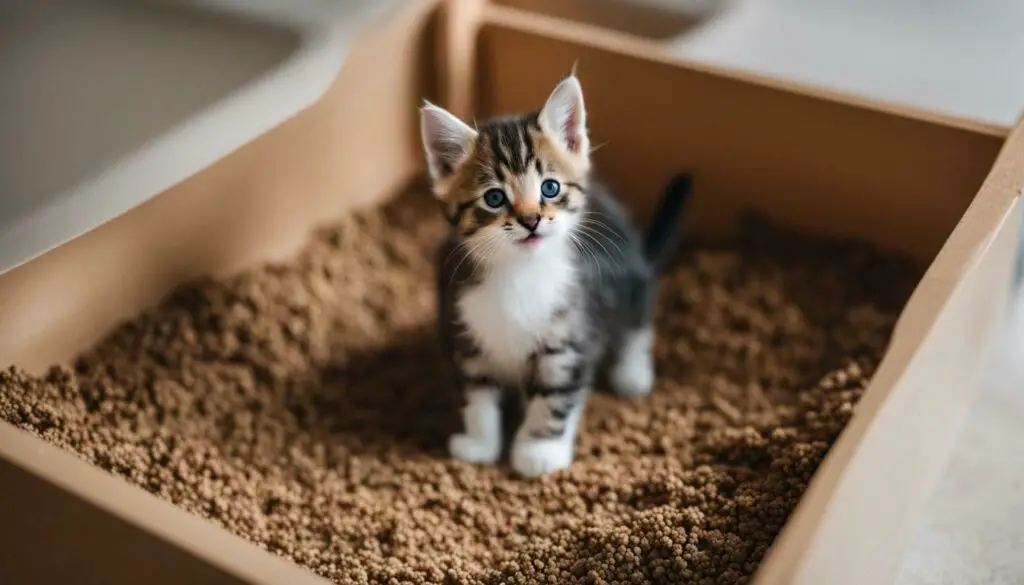Do you wonder why your adorable kitten is meowing in the litter box? In this article, we will uncover the common causes and offer practical solutions to help your furry friend feel more at ease.
Key Takeaways
- Kittens may meow in the litter box due to various reasons, such as a dirty litter box, urinary crystals or infections, constipation, dehydration, stress, or their natural vocal nature.
- Regularly cleaning the litter box and providing proper litter box training can help address meowing caused by a dirty environment.
- Consulting a veterinarian is crucial if you suspect any underlying health issues contributing to your kitten’s meowing in the litter box.
- Creating a calm and stress-free environment for your kitten can significantly reduce meowing in the litter box.
- Patience and consistency are key when training your kitten to establish positive litter box habits and minimize meowing.
Understanding Kitten Communication in the Litter Box
As pet owners, it is crucial to decode the messages our kittens are trying to convey through their behavior, especially when they meow in the litter box. Understanding kitten behavior and communication can help us address any underlying issues and ensure their well-being.
Kittens meowing in the litter box can be an indication of various factors. One common cause is a dirty litter box. Just like humans, cats prefer a clean environment, and a dirty litter box can cause discomfort and even stress for your kitten. Regularly cleaning the litter box and ensuring it is fresh and inviting can help prevent excessive meowing.
Another potential cause of meowing in the litter box is urinary crystals or a urinary tract infection. These conditions can be painful for kittens, particularly during urination. If you notice your kitten meowing excessively while using the litter box, it may be necessary to consult a veterinarian to rule out any urinary issues.
| Causes of Meowing in the Litter Box | Solutions |
|---|---|
| Dirty litter box | Regularly clean and maintain a fresh litter box |
| Urinary crystals or infections | Consult a veterinarian for proper diagnosis and treatment |
| Constipation | Ensure your kitten has a balanced diet and monitor their bowel movements |
| Dehydration and inadequate water intake | Provide fresh water regularly and encourage your kitten to stay hydrated |
| Stress | Create a calm and comfortable environment for your kitten |
| Natural vocal personality | Observe your kitten’s behavior and seek professional advice if needed |
Constipation can also lead to meowing in the litter box, especially if the kitten is having difficulty passing stool. A well-balanced diet and monitoring their bowel movements can help prevent constipation in kittens. Additionally, it is important to ensure your kitten stays hydrated. Dehydration and inadequate water intake can contribute to constipation, so provide fresh water regularly and encourage your kitten to drink.
Stress can be another factor that causes kittens to meow in the litter box. Changes in the environment or new experiences can trigger stress in kittens, leading to excessive meowing. Creating a calm and comfortable space for your kitten, minimizing sudden changes, and providing them with a safe and predictable environment can help reduce stress-related meowing.
Observing Your Kitten’s Behavior
It is important to observe your kitten’s behavior and body language to understand their needs and address any potential issues. If you notice persistent meowing in the litter box or any other concerning behavior, it may be best to consult a veterinarian. They can provide professional guidance, conduct necessary tests, and recommend appropriate treatment if there are any underlying health concerns.
Dirty Litter Box: The Culprit Behind Meowing Kittens
A dirty litter box can cause distress for your kitten, leading to excessive meowing and discomfort during their bathroom routine. Ensuring a clean litter box is essential for their well-being and proper litter box training.
Here are some litter box tips for kittens:
- Regular cleaning: Scoop the litter box at least once a day to remove waste. Completely change the litter and clean the box with mild soap and water on a weekly basis.
- Proper litter depth: Provide enough litter for your kitten to comfortably dig and cover their waste. Aim for a depth of about 2-3 inches.
- Choose the right litter: Use a litter that your kitten prefers and is safe for their health. Avoid scented litters, as the artificial fragrances may deter them from using the litter box.
- Multiple litter boxes: If you have more than one kitten, it’s important to have multiple litter boxes available to prevent territorial disputes and ensure easy access for all kittens.
By following these litter box tips for kittens, you can maintain a clean and comfortable environment that encourages your kitten to use the litter box without excessive meowing or distress.
| Litter Box Tips for Kittens | Benefits |
|---|---|
| Regular cleaning | Prevents odor buildup and maintains hygiene |
| Proper litter depth | Provides a comfortable and natural digging experience |
| Choose the right litter | Ensures your kitten’s preference and safety |
| Multiple litter boxes | Reduces territorial disputes and increases accessibility |
Remember, maintaining a clean litter box and following these litter box tips are crucial for your kitten’s well-being and proper litter box training. A clean and comfortable litter box will help minimize meowing and ensure a stress-free bathroom routine for your kitten.
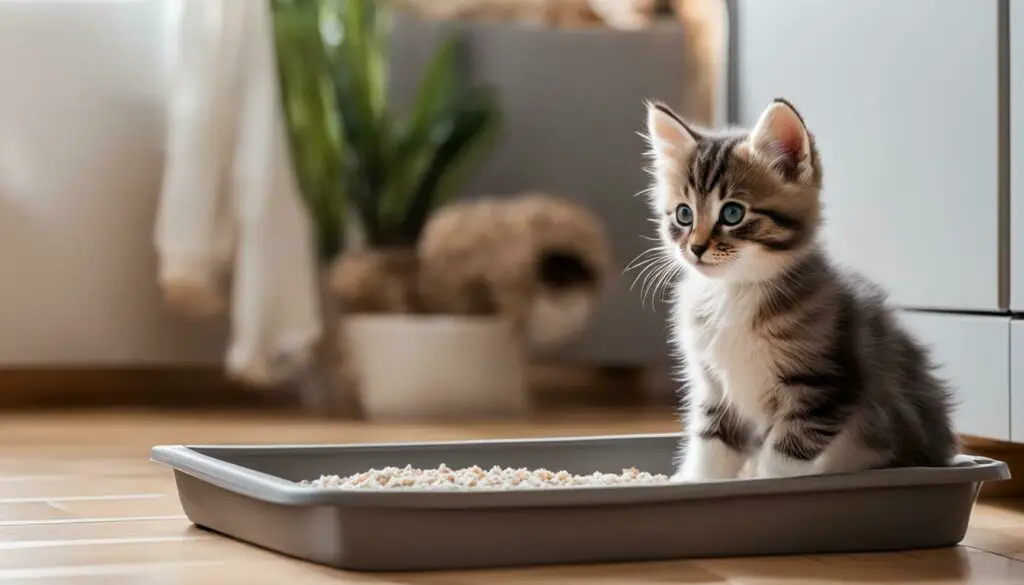
Summarizing: A dirty litter box can cause distress for kittens, leading to excessive meowing and discomfort during their bathroom routine. Regular cleaning, proper litter depth, choosing the right litter, and having multiple litter boxes are key tips to encourage proper litter box training and reduce meowing. Creating a clean and comfortable environment will contribute to your kitten’s well-being and ensure a stress-free bathroom experience.
Urinary Crystals and Infections: A Painful Experience for Kittens
If your kitten is meowing intensely while using the litter box, it could be a sign of urinary crystals or a urinary tract infection, causing discomfort during urination. These conditions are more common in male kittens and can be quite painful if left untreated.
Urinary crystals are small, jagged mineral formations that can develop in a kitten’s urinary tract. They can cause irritation and blockage, making it difficult for the kitten to urinate properly. This can lead to increased meowing in the litter box as they try to alleviate the discomfort.
A urinary tract infection (UTI) occurs when bacteria enter the kitten’s urinary system. This can cause inflammation and pain, leading to meowing while using the litter box. UTIs can be diagnosed by a veterinarian through a urine sample and usually require antibiotics for treatment.
To prevent urinary crystals and infections, it’s important to ensure your kitten has access to fresh, clean water at all times. Providing a high-quality, balanced diet that promotes urinary health is also essential. Regular veterinary check-ups can help detect any underlying issues early on and prevent complications.
| Signs of Urinary Crystals and Infections: | Prevention and Treatment: |
|---|---|
|
|
Remember, if you notice your kitten meowing intensely in the litter box, it’s important to consult a veterinarian. They can provide a proper diagnosis and recommend the necessary treatment to alleviate your kitten’s discomfort and promote urinary health.
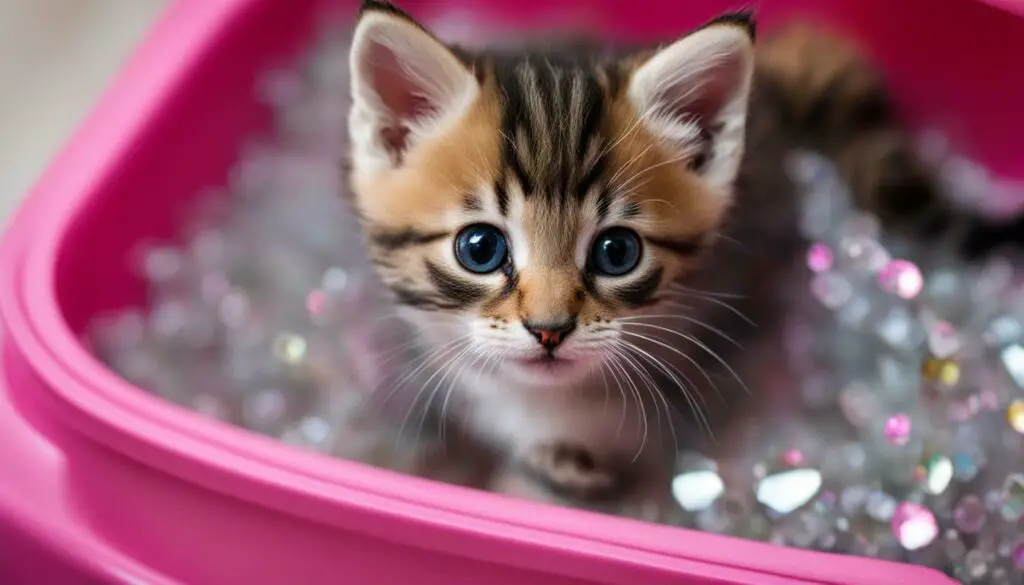
Constipation and Meowing: When Passing Stool Becomes a Struggle
When your kitten experiences constipation, it can be a challenging and uncomfortable process, leading to meowing fits while using the litter box. Constipation occurs when your kitten has difficulty passing stool, and it can be caused by various factors such as diet, inadequate hydration, or underlying health conditions.
One way to alleviate constipation is by ensuring your kitten’s diet includes enough fiber. This can be achieved by offering them high-quality kitten food that is specifically formulated to promote healthy digestion. Additionally, providing your kitten with plenty of fresh water is crucial to prevent dehydration, which can contribute to constipation.
It’s important to observe your kitten’s behavior and look out for signs of constipation, such as straining in the litter box or the passage of small, hard stools. If you notice these symptoms, you can try gently massaging their abdomen to stimulate bowel movements. However, if the constipation persists or worsens, it is essential to consult a veterinarian for a proper diagnosis and treatment plan.
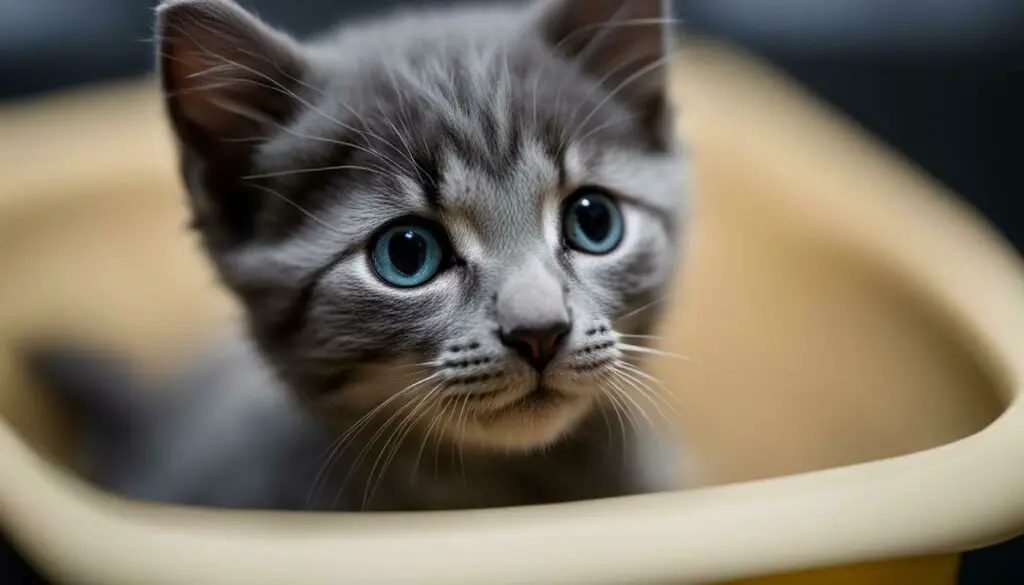
| Causes of Constipation in Kittens | Prevention and Treatment |
|---|---|
| Insufficient fiber in diet | Offer high-quality kitten food formulated for healthy digestion |
| Lack of hydration | Ensure fresh water is always available and encourage drinking |
| Underlying health conditions | Consult a veterinarian for a thorough examination and appropriate treatment |
By addressing constipation in kittens, you can help alleviate their discomfort and prevent meowing fits in the litter box. Remember to maintain a clean litter box routine and create a calm environment to minimize stress. With patience and consistency, you can establish positive litter box habits and ensure your kitten’s well-being.
Dehydration and Inadequate Water Intake: A Constipation Culprit
Dehydration and insufficient water consumption can lead to constipation in kittens, resulting in meowing episodes during their litter box time. It is crucial to ensure that your kitten is adequately hydrated as dehydration can cause the stool to become dry and hard, making it difficult for them to pass it. Encouraging your kitten to drink water regularly is essential for their overall health and well-being.
To prevent dehydration and promote proper water intake, make sure to provide clean and fresh water for your kitten at all times. Consider using a shallow water dish or a pet water fountain to entice them to drink more. Placing multiple water stations around the house can also help make water more accessible for your kitten, especially if they tend to spend a lot of time in different areas.
| Signs of Dehydration: | Prevention Tips: |
|---|---|
|
|
If you suspect that your kitten is dehydrated or experiencing constipation due to inadequate water intake, it is essential to consult a veterinarian. They can provide guidance on proper hydration techniques and may recommend additional interventions such as dietary adjustments or supplements to alleviate constipation and ensure your kitten’s comfort.

Remember, maintaining proper water consumption is crucial for your kitten’s overall health. By recognizing the signs of dehydration and taking steps to prevent it, you can help reduce the chances of constipation and minimize meowing episodes during litter box time. Creating a cat-friendly environment with easy access to clean water will contribute to your kitten’s well-being and promote their overall happiness.
Stress and Meowing in the Litter Box
Just like humans, kittens can experience stress, and this emotional state can cause them to meow incessantly while in the litter box. It’s important to understand that kittens are highly sensitive creatures, and any disruptions or changes in their environment can easily trigger stress. This can include moving to a new home, introducing new pets or people, or even rearranging furniture. When a kitten feels stressed, they may vocalize their discomfort in the litter box as a way to seek attention or express their anxiety.
To help alleviate stress in your kitten, it’s crucial to create a calm and comforting environment. Minimize any sudden changes and provide them with a safe and secure space where they can retreat when they feel overwhelmed. Consider using pheromone diffusers or calming scents to promote relaxation. Additionally, ensure that your kitten has plenty of mental and physical stimulation through play and daily exercise. This will help them to release any pent-up energy and reduce their overall stress levels.
| Signs of Stress in Kittens | How to Reduce Stress Levels |
|---|---|
| Excessive grooming |
|
| Loss of appetite |
|
| Hiding or avoiding social interaction |
|
“A stressed kitten may exhibit behavioral changes, such as excessive vocalization in the litter box. By addressing the underlying stressors and providing a calm environment, you can help your kitten feel more relaxed and reduce their meowing.”
Seeking Professional Advice
If your kitten’s meowing in the litter box persists despite your efforts to reduce stress, it may be wise to consult with a veterinarian. They can conduct a thorough examination to rule out any underlying health issues that may be contributing to their behavior. A veterinarian may also recommend additional techniques or treatments to help alleviate stress in your kitten and promote better litter box habits.
Remember, each kitten is unique, and what works for one may not work for another. It’s important to be patient and consistent in your approach, providing your kitten with the love and care they need to thrive. By understanding the causes of meowing in the litter box and taking steps to address them, you can help your kitten maintain a healthy and stress-free litter box experience.
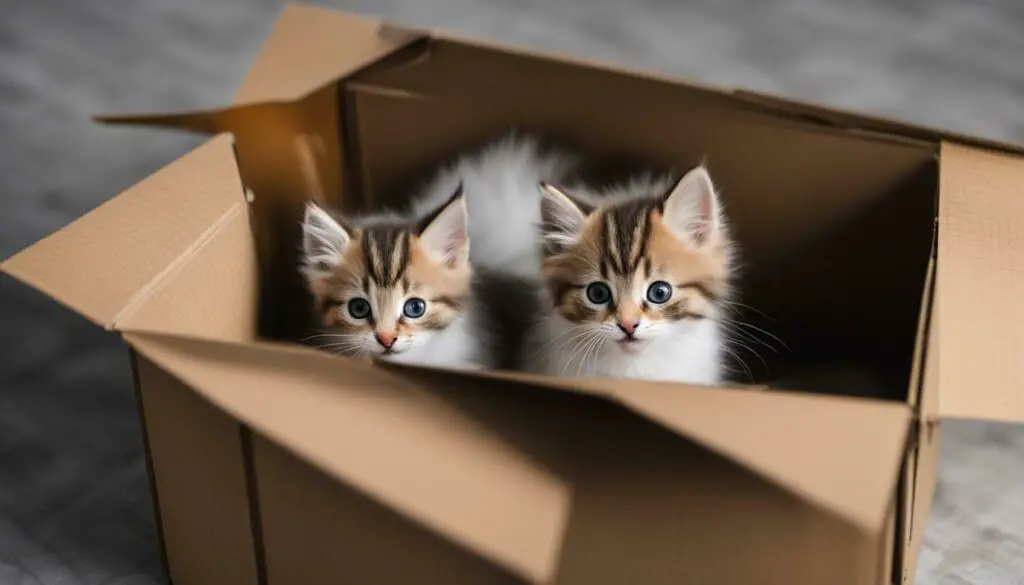
Some Kittens are Just More Vocal: A Natural Personality Trait
Some kittens have a natural inclination for vocalization, and as a result, they may express themselves through meowing, even in the litter box. This behavior can be attributed to their unique personality traits and is not necessarily a cause for concern. However, it’s essential to distinguish between normal vocalization and excessive meowing, particularly when it comes to their litter box habits.
During my experience as a feline behavior specialist, I have encountered numerous kittens who simply love to communicate through meowing. They may use their voice to express excitement, frustration, or even boredom. This vocalization in the litter box is one way they may seek attention or communicate their needs to their owners.
It is important to remember that each kitten is an individual, and their vocalization tendencies vary. While some may remain silent in the litter box, others may let out a symphony of meows. If your kitten falls into the latter category, it’s crucial to ensure that they are not facing any underlying issues that may be causing discomfort or pain. Observing their behavior, consulting a veterinarian, and providing a clean and calming litter box environment are key steps in addressing their needs.
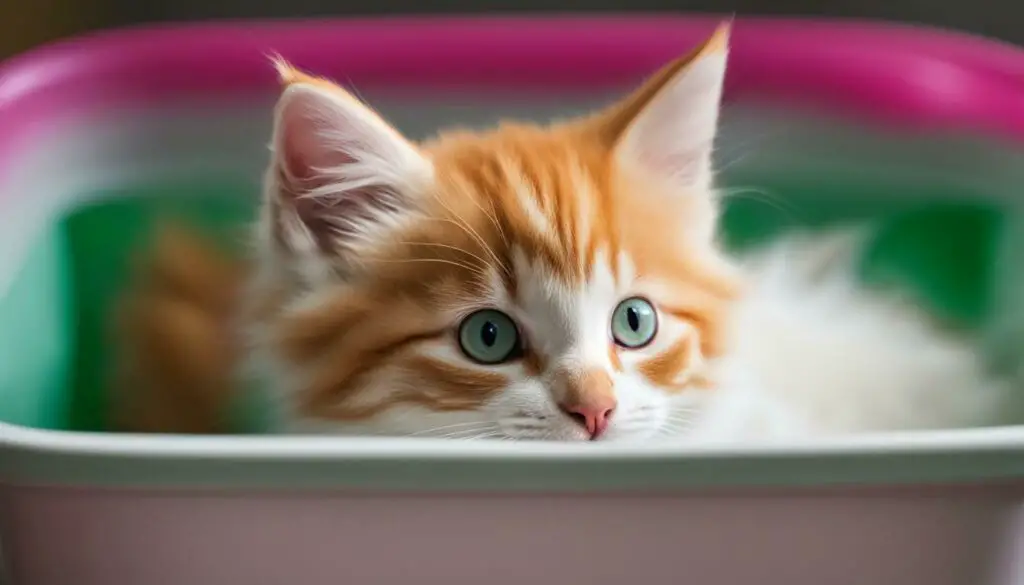
As responsible kitten owners, we must embrace the uniqueness of our feline companions. Understanding that some kittens are naturally more vocal helps us appreciate their individuality and adapt our caregiving accordingly. By observing their behavior, providing proper care, and seeking professional guidance when needed, we can create a harmonious environment for our kittens to express themselves, even in the litter box.
Observing Your Kitten’s Behavior
Being attuned to your kitten’s behavior can provide valuable insights into their well-being, especially when they exhibit unusual behavior like excessive meowing in the litter box. Kittens communicate through various actions and vocalizations, and understanding their language is key to addressing any underlying issues. By observing their behavior, you can determine whether their meowing in the litter box is due to a dirty environment, health problems, stress, or simply their natural personality.
One way to observe your kitten’s behavior is to pay attention to their litter box habits. Take note of how frequently they use the litter box and whether they meow during or after eliminating. If their meowing is accompanied by straining or discomfort, it may indicate constipation or urinary issues. Additionally, check the cleanliness of the litter box. A dirty box can be a source of stress and discomfort for kittens, leading to meowing.
Another aspect to observe is your kitten’s overall behavior and demeanor. Are they exhibiting signs of stress or anxiety, such as excessive grooming, hiding, or aggression? Changes in their environment or routine can trigger stress-related behaviors, including meowing in the litter box. Creating a calm and comfortable space for your kitten, with familiar toys, bedding, and soothing background noise, can help alleviate their stress levels.
Table: Common Behavioral Observations
| Behavior | Possible Causes |
|---|---|
| Excessive meowing in the litter box |
– Dirty litter box – Urinary issues – Constipation – Stress or anxiety – Natural vocalization |
| Excessive grooming |
– Stress or anxiety – Skin irritation or allergies |
| Hiding or avoiding the litter box |
– Stress or anxiety – Pain or discomfort during elimination |
It’s important to remember that each kitten is unique, and their behavior can vary. If you notice any concerning or persistent meowing in the litter box, it is advisable to consult a veterinarian. They can evaluate your kitten’s health and provide guidance on resolving any behavioral issues. By closely observing your kitten’s behavior and seeking professional advice when needed, you can help ensure their well-being and create a positive litter box experience for both of you.
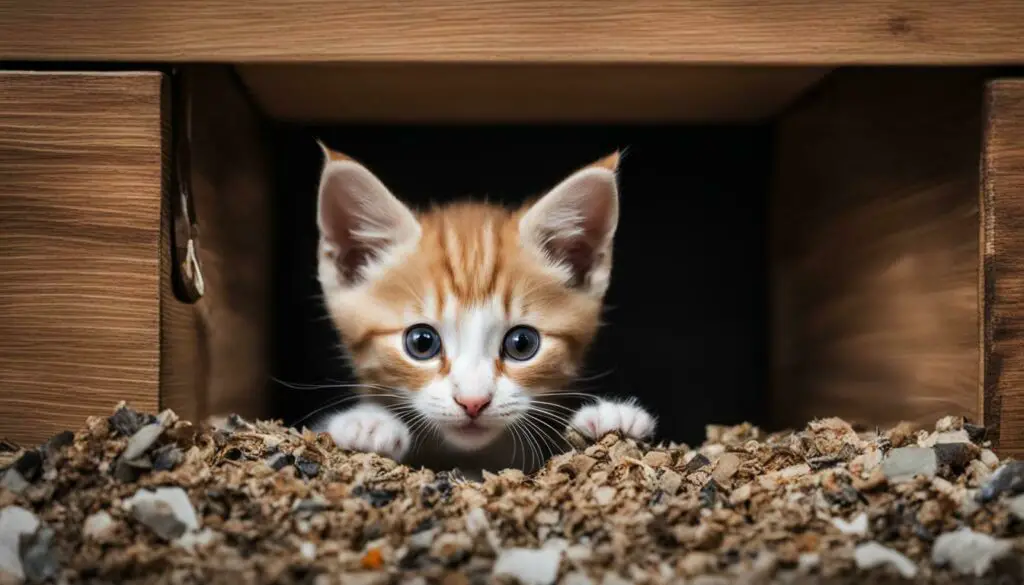
Consulting a Veterinarian for Health Concerns
If you believe your kitten’s meowing in the litter box is a result of underlying health problems, reaching out to a veterinarian is essential for a proper diagnosis and treatment plan. As kittens are more vulnerable to health issues, it’s crucial to address any concerns promptly. A veterinarian can provide expert guidance and help identify the root cause of your kitten’s meowing behavior.
During your veterinary consultation, the professional will conduct a thorough examination of your kitten to rule out any potential health issues. They may also recommend specific tests, such as urinalysis or bloodwork, to further assess your kitten’s overall health. These tests can help detect any urinary crystals, infections, or other medical conditions that may be contributing to their meowing in the litter box.
Additionally, a veterinarian can offer valuable advice on proper litter box training techniques and provide specific recommendations based on your kitten’s individual needs. They may suggest modifications to your litter box setup, such as using a different type of litter or providing additional litter boxes in multiple locations. They can also guide you on establishing a clean and consistent litter box routine to prevent any further meowing caused by a dirty environment.
Remember, kittens rely on us to provide them with the care and support they need to thrive. By consulting a veterinarian, you can ensure that your kitten’s health is prioritized, and any underlying issues affecting their behavior in the litter box are addressed appropriately. Regular veterinary check-ups and open communication with your veterinarian are key factors in maintaining your kitten’s well-being.
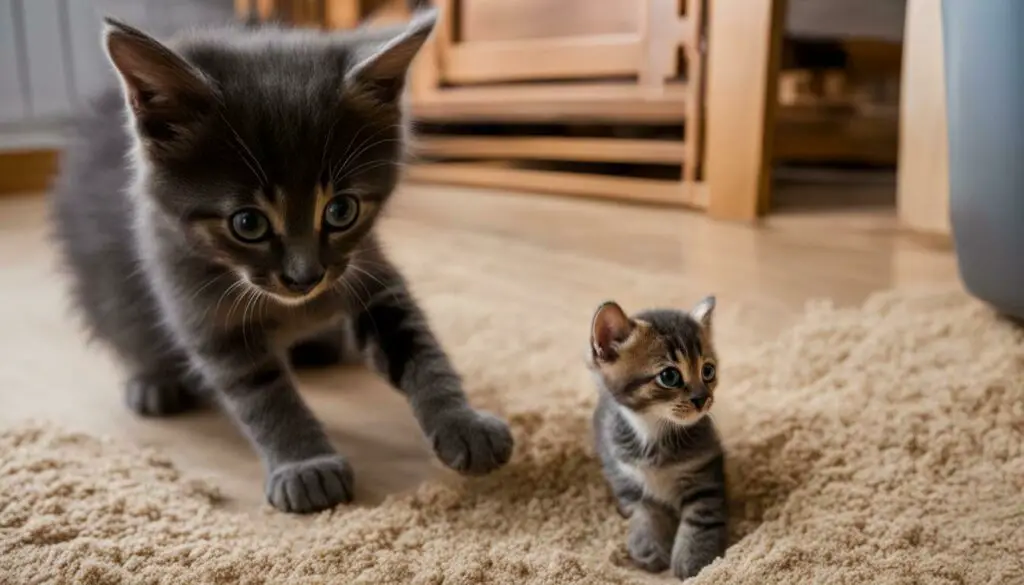
| Benefits of Consulting a Veterinarian | Signs of Underlying Health Issues |
|---|---|
|
|
“It’s important to remember that kittens are more susceptible to health issues, and their meowing in the litter box could be a sign of an underlying problem. A veterinarian should be consulted to ensure your kitten receives the necessary care and treatment.” – Dr. Smith, Veterinarian
Tips to Ease Meowing in the Litter Box
To alleviate your kitten’s distress and promote appropriate litter box behavior, here are some effective tips and techniques to try:
1. Maintain a clean litter box routine
Regularly clean and scoop the litter box to ensure it is free from waste and odor. Kittens are more likely to meow in a dirty litter box, so keeping it clean will encourage them to use it without discomfort. Consider using clumping litter for easier maintenance.
2. Use a kitten-friendly litter
Choose a litter that is safe and comfortable for your kitten’s sensitive paws. Avoid litter with strong scents as they may deter your kitten from using the litter box. Experiment with different types of litter to find the one your kitten prefers.
3. Provide multiple litter boxes
Having more than one litter box can reduce the chances of your kitten meowing when the litter box is occupied. Place them in different areas of your home to give your kitten easy access to a litter box wherever they are.
4. Establish a consistent feeding and watering schedule
A regular routine for meals and water intake can help prevent constipation and dehydration, which are common causes of meowing in the litter box. Make sure your kitten has access to fresh water at all times.
5. Create a calm and stress-free environment
Kittens may meow in the litter box due to stress or anxiety. Minimize loud noises, sudden changes, and ensure their litter box is placed in a quiet and private area. Provide toys and scratching posts to keep them mentally stimulated and reduce stress levels.
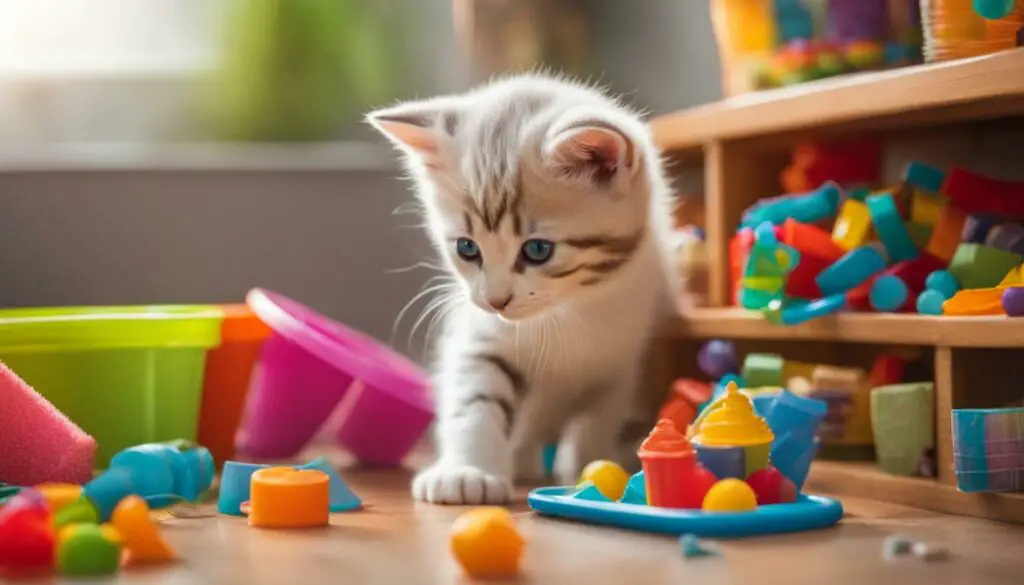
6. Positive reinforcement and rewards
Praise and reward your kitten every time they use the litter box correctly. Use treats or gentle petting to reinforce the desired behavior. Avoid punishment or negative reinforcement, as it can create anxiety and further contribute to meowing in the litter box.
7. Seek veterinary advice if necessary
If your kitten’s meowing in the litter box persists despite your efforts, it’s advisable to consult a veterinarian. They can rule out any underlying health issues and provide further guidance on managing your kitten’s behavior.
| Summary: |
|---|
| By following these tips and techniques, you can help alleviate your kitten’s distress and promote appropriate litter box behavior. Remember to maintain a clean litter box routine, use a kitten-friendly litter, provide multiple litter boxes, establish a consistent feeding and watering schedule, create a calm environment, use positive reinforcement, and seek veterinary advice if needed. With patience and consistency, you can help your kitten develop healthy litter box habits and minimize meowing in the litter box. |
Maintaining a Clean Litter Box Routine
A clean litter box is crucial to ensure your kitten feels comfortable and safe during their bathroom breaks, reducing the likelihood of excessive meowing. Regular cleaning and maintenance of the litter box will help create a pleasant environment for your kitten and encourage proper litter box habits.
Here are some tips to help you establish and maintain a clean litter box routine:
- Choose the right litter: Opt for a litter that is low in dust and clumping, as these tend to be easier to clean and prevent odors. Remember to avoid strongly scented litters, as they may be overwhelming for your kitten.
- Invest in a litter box with high sides: This helps prevent litter spillage and reduces the chances of your kitten tracking litter around the house. It also provides your kitten with a sense of security and privacy.
- Scoop the litter box daily: Remove any clumps or solid waste from the litter box using a scooper. This will prevent the build-up of odor and discomfort for your kitten.
- Replace the litter regularly: Completely change the litter and clean the litter box at least once a week to maintain a fresh and hygienic environment for your kitten.
Remember, consistency is key when it comes to maintaining a clean litter box routine. By following these tips, you can ensure that your kitten has a pleasant and stress-free experience in the litter box, reducing the chances of excessive meowing and promoting a healthy litter box habit.
| Litter Box Cleaning Frequency | Kitten Age |
|---|---|
| Once a day | Up to 3 months |
| Every other day | 3-6 months |
| Twice a week | 6 months and older |
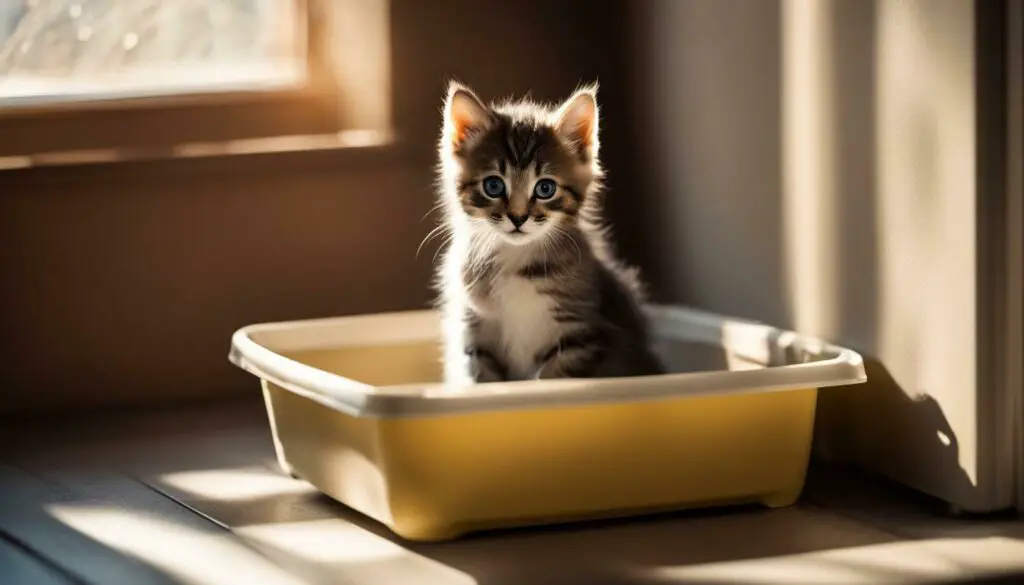
A clean litter box is the foundation of successful litter box training for kittens. It not only ensures their comfort but also promotes good hygiene and reduces the chances of meowing in the litter box. By following a regular cleaning routine and providing a suitable litter box, you can create a positive environment for your kitten’s bathroom needs.
Creating a Calm Environment for Your Kitten
By creating a calming atmosphere for your kitten, you can help reduce their meowing and establish a positive litter box experience for both of you. Kittens are sensitive creatures, and their behavior can be influenced by their environment. Here are some tips to create a calm and stress-free environment for your kitten:
- Designate a quiet space: Find a quiet corner in your home where your kitten can have their litter box. Avoid placing it in high-traffic areas or areas with loud noises. This will help your kitten feel secure and minimize distractions.
- Provide hiding spots: Kittens often seek comfort in small, enclosed spaces. Create hiding spots using boxes or cozy beds where your kitten can retreat to when they feel overwhelmed. This will give them a sense of security and help reduce stress.
- Use soothing scents: Certain scents, like lavender or chamomile, have calming properties. Consider using a pheromone diffuser or spray designed for cats to create a relaxing atmosphere. However, always check with your veterinarian before using any products around your kitten.
- Establish a routine: Kittens thrive on routine. Stick to a consistent feeding and play schedule, as well as regular litter box cleaning. Predictability can help reduce their anxiety and create a sense of security.
Remember, each kitten is unique, and what works for one may not work for another. Observe your kitten’s behavior and adjust the environment accordingly. If you notice persistent meowing or signs of distress, it’s best to consult a veterinarian to rule out any underlying health issues.
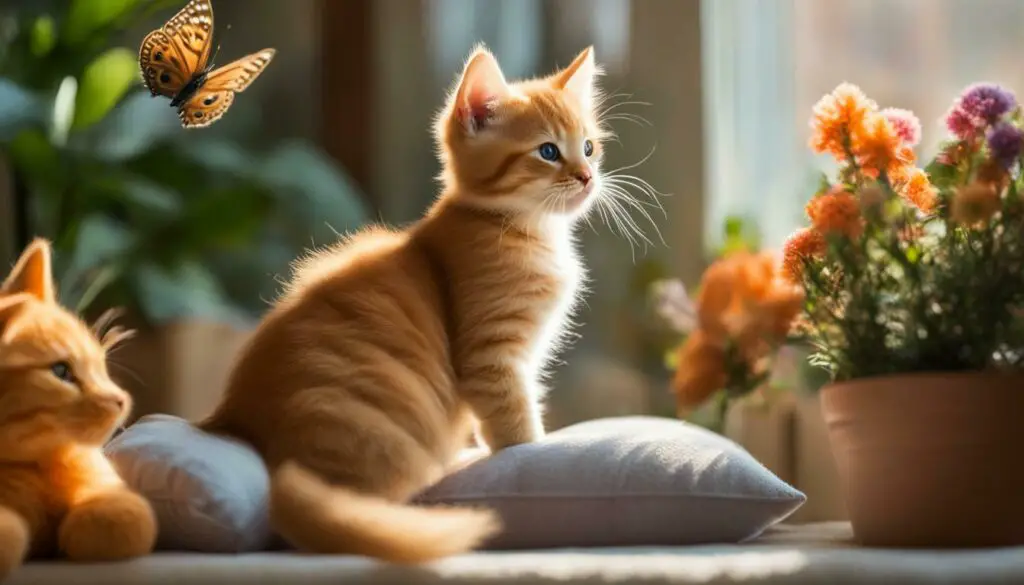
Creating a calm environment for your kitten is essential for their overall well-being. By following these tips and providing a stress-free space, you can help reduce meowing in the litter box and foster a positive litter box experience for both you and your furry friend.
Patience and Consistency: Keys to Successful Training
Training your kitten to have proper litter box habits requires patience, consistency, and positive reinforcement to achieve long-term success. It’s important to remember that kittens are still learning and may need guidance as they adjust to using the litter box. By following a few simple tips, you can help your kitten develop good litter box habits and minimize their meowing in the process.
First and foremost, ensure that the litter box is easily accessible for your kitten. Place it in a quiet, private area of your home where they can feel relaxed and comfortable. Keep in mind that kittens have small bladders and may need to use the litter box frequently, so having multiple litter boxes throughout your home can be beneficial.
Consistency is key when it comes to training your kitten. Establish a regular routine for them by feeding them at the same time each day and taking them to the litter box immediately after mealtimes. Use positive reinforcement, such as praise and treats, when your kitten successfully uses the litter box. This will help them associate using the litter box with a positive experience and encourage them to continue doing so.
Additionally, be patient with your kitten during the training process. Understand that accidents may happen, especially in the beginning, and avoid punishing or scolding them. Instead, clean up any accidents promptly and use an enzymatic cleaner specifically designed for pet messes to eliminate any lingering odors that may attract your kitten back to the same spot. Remember, a calm and positive environment will help your kitten feel more at ease and make the training process smoother.
Training your kitten to use the litter box requires time and effort, but with patience, consistency, and positive reinforcement, you can establish good litter box habits. By creating a comfortable and stress-free environment for your kitten and being attentive to their needs, you can help minimize meowing in the litter box and ensure a positive experience for both you and your furry friend.
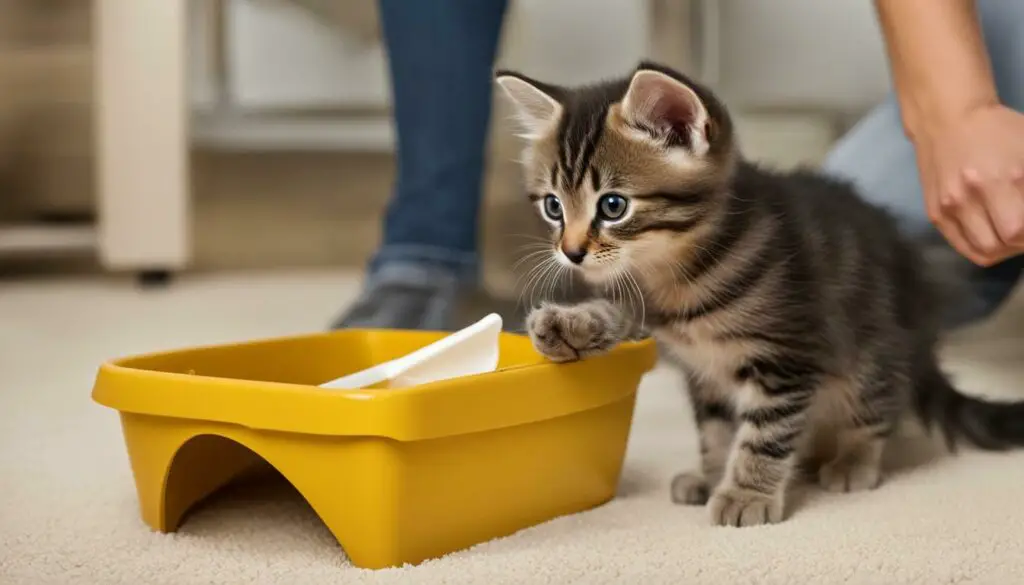
| Tips for Successful Litter Box Training |
|---|
| 1. Provide multiple litter boxes: Place litter boxes in different areas of your home to make them easily accessible for your kitten. |
| 2. Establish a routine: Feed your kitten at the same time each day and take them to the litter box immediately after meals to encourage regular elimination. |
| 3. Use positive reinforcement: Praise and reward your kitten with treats when they use the litter box correctly to reinforce good behavior. |
| 4. Be patient: Accidents may happen, especially during the training period. Avoid scolding or punishing your kitten and instead, clean up accidents promptly with an enzymatic cleaner. |
| 5. Create a calm environment: Minimize loud noises and changes in the environment, providing a stress-free space for your kitten to feel comfortable. |
Conclusion
Meowing in the litter box can be a sign of various issues, but with the right knowledge and proactive measures, you can help your kitten feel more comfortable and secure during their litter box routine.
One of the main factors to consider is the cleanliness of the litter box. Regular cleaning is essential to ensure a hygienic environment for your kitten. A dirty litter box can trigger meowing as kittens have a natural instinct to keep their surroundings clean. By scooping the litter box daily and changing the litter frequently, you can minimize the chances of meowing caused by a dirty environment.
Health issues such as urinary crystals or infections, constipation, and dehydration can also contribute to meowing in the litter box. It is important to observe your kitten’s behavior and seek professional advice from a veterinarian if you suspect any underlying health concerns. A vet can provide guidance on appropriate treatment and preventive measures to alleviate your kitten’s discomfort and reduce meowing in the litter box.
Creating a calm and stress-free environment for your kitten is crucial. Stress can manifest as meowing in the litter box, so minimizing changes in their surroundings can help reduce their anxiety levels. Providing a designated, quiet space for the litter box and making sure it is easily accessible can go a long way in ensuring your kitten feels safe and secure during their bathroom breaks.
Remember, some kittens are naturally more vocal than others. While it may be a part of their personality, it’s always important to be vigilant and address any excessive meowing. By maintaining a clean litter box routine, addressing health concerns promptly, and creating a calm environment, you can help your kitten establish positive litter box habits and minimize meowing in the litter box.
FAQ
Why is my kitten meowing in the litter box?
Kittens meowing in the litter box can be a sign of various issues, including a dirty litter box, urinary crystals or infections, constipation, dehydration, stress, or simply a more vocal nature. It’s important to observe your kitten’s behavior and consult a veterinarian if you suspect any underlying health issues.
How can a dirty litter box cause my kitten to meow?
A dirty litter box can trigger meowing in kittens because they prefer to have a clean and hygienic place to do their business. Regularly cleaning the litter box and ensuring it is well-maintained can help prevent this behavior.
What are urinary crystals and how can they cause meowing in kittens?
Urinary crystals are small, hard deposits that can form in a kitten’s urinary system. These crystals can be painful, especially during urination, which can result in meowing in the litter box. A urinary tract infection can also cause similar symptoms.
Can constipation lead to meowing in the litter box?
Yes, constipation can cause meowing in the litter box, particularly if the kitten is having difficulty passing stool. It’s important to ensure your kitten has a balanced diet and adequate hydration to prevent constipation.
How does dehydration contribute to meowing in the litter box?
Dehydration and inadequate water intake can lead to constipation, which in turn can cause meowing in the litter box. Ensuring your kitten has access to fresh water and staying hydrated is essential for their overall health and digestive system.
Can stress cause my kitten to meow in the litter box?
Yes, stress can manifest as meowing in the litter box for kittens. Minimizing changes in the environment, providing a calm and comfortable space for your kitten, and reducing stress triggers can help alleviate this behavior.
Why is my kitten more vocal in general?
Some kittens are naturally more vocal than others, and this can contribute to their meowing in the litter box. It’s important to understand and accept your kitten’s unique personality traits and provide appropriate care and attention.
What should I do if my kitten is meowing excessively in the litter box?
Observing your kitten’s behavior and consulting a veterinarian if you suspect any underlying health issues is crucial. They can provide guidance and recommend appropriate solutions to address the excessive meowing in the litter box.

